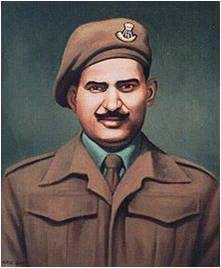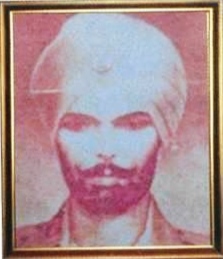See also
- Ishar Singh Marhana (1878–1941), Akali activist and Ghadr revolutionary
Ishar Singh (1895-1963) was a soldier in the British Indian Army and a recipient of the Victoria Cross.
Ishar Singh may also refer to:
Havildar or havaldar is a rank in the Indian, Pakistani and Nepalese armies, equivalent to sergeant. It is not used in cavalry units, where the equivalent is daffadar.
Umrao Singh Yadav was an Indian recipient of the Victoria Cross (VC), the highest and most prestigious award for gallantry in the face of the enemy that can be awarded to British and Commonwealth forces. He was a non-commissioned officer in the Royal Artillery or the Royal Indian Artillery to be awarded the Victoria Cross during the Second World War, and the last survivor of only 40 Indian soldiers to be awarded the VC between 1912, when Indians first became eligible to be awarded the VC, to Indian independence in 1947.

The Jat Regiment is an infantry regiment of the Indian Army, of which it is one of the longest-serving and most-decorated regiments. The regiment has won 19 battle honours between 1839 and 1947, and post-independence it has won five battle honours, including 2 Victoria Cross, 8 Mahavir Chakra, 8 Kirti Chakra, 34 Shaurya Chakras, 39 Vir Chakras and 170 Sena Medals. During its 200-year service history, the regiment has participated in various actions and operations in India and abroad, including the First and the Second World Wars. Numerous battalions of the Jat Regiment, including the 14th Murray's Jat Lancers, fought in the First World War.
Junior Commissioned Officer (JCO) is a term used for a group of military ranks which is higher than havildar and lower than lieutenant. The term is only used by Bangladesh, India, and Pakistan. Senior havildars are promoted to JCO rank on the basis of merit and seniority, restricted by the number of vacancies. JCOs are treated as a separate class and hold additional privileges. Primarily the term was associated with armies but since the 2000s India and Pakistan's navies and air forces are using the term to indicate their Chief Petty Officers and Warrant Officers.

The Sikh Regiment is an infantry regiment of the Indian Army. Sikh regiment is the highest decorated regiment of the Indian Army and in 1979, the 1st battalion was the Commonwealth's most decorated battalion with 245 pre-independence and 82 post-independence gallantry awards, when it was transformed into the 4th battalion, Mechanised Infantry Regiment. The first battalion of the regiment was officially raised just before the partial annexation of the Sikh Empire on 1 August 1846, by the British East India Company. Currently, the Sikh Regimental Centre is located in Ramgarh Cantonment, Jharkhand. The Centre was earlier located in Meerut, Uttar Pradesh.
Indian Army Ranks can be broadly classified into three categories: Commissioned Officers, Junior Commissioned Officers and Other Ranks.
Jagraon is a city and a municipal council, a rural police district and a sub-division of the Ludhiana district in the Indian state of Punjab. Jagraon is more than three centuries old. It has been thought that the city's original name was Jagar aon, meaning "a place of great flooding," although this flooding has since ceased. It could also be argued that Jagraon actually derives from a source with a suffix "-graon" being a development of the Sanskrit Grama, meaning "village" as in the Hindi word Gaon. Jagraon is at almost the geographical center of Punjab state, 16 kilometres (9.9 mi) from the River Satluj. It is 37 km (23 mi) from its district headquarters Ludhiana, 29 km (18 mi) from Moga, 31 km (19 mi) from Nakodar and 54 miles from Barnala. Jagraon is known for its thriving rice mills. More than 100 rice mills are situated in Jagraon area.

The Indian Order of Merit (IOM) was a military and civilian decoration of British India. It was established in 1837, although following the Partition of India in 1947 it was decided to discontinue the award and in 1954 a separate Indian honours system was developed, to act retrospectively to 1947. For a long period of time the IOM was the highest decoration that a native member of the British Indian Army could receive and initially it had three divisions. This was changed in 1911 when Indian servicemen became eligible for the Victoria Cross. A civilian division of the IOM also existed between 1902 and 1939, however, it was only conferred very rarely.
Ishar is a series of three role-playing computer games by Silmarils.

The Battle of Saragarhi was a last-stand battle fought before the Tirah Campaign between the British Raj and Afghan tribesmen. On 12 September 1897, an estimated 12,000 – 24,000 Orakzai and Afridi tribesmen were seen near Gogra, at Samana Suk, and around Saragarhi, cutting off Fort Gulistan from Fort Lockhart. The Afghans attacked the outpost of Saragarhi where thousands of them swarmed and surrounded the fort, preparing to assault it. Led by Havildar Ishar Singh, the 21 soldiers in the fort—all of whom were Sikhs—refused to surrender and were wiped out in a last stand. The post was recaptured two days later by another British Indian contingent.

Company Havildar Major Piru Singh Shekhawat was an Indian Army non-commissioned officer, awarded the Param Vir Chakra (PVC), India's highest military decoration 3245.

Sikhs served in the British Indian Army throughout the British Raj. Sikh units fought at the Battle of Saragarhi; in the First World War, as the "Black Lions", as well as during the Second World War in Malaya, Burma and Italy.

Kesari (transl. Saffron) is a 2019 Indian Hindi-language war film written and directed by Anurag Singh. It was jointly produced by Aruna Bhatia, Karan Johar, Hiroo Yash Johar, Apoorva Mehta, and Sunir Khetarpal under the banners of Dharma Productions, Cape of Good Films, Azure Entertainment, and Zee Studios. The film stars Akshay Kumar with Parineeti Chopra in a special appearance, Vikram Singh Chauhan, Sarwar, Vansh Bhardwaj, Jaspreet Singh, Vivek Saini, Vikram Kochhar, and Rakesh Sharma in supporting roles. It follows the events leading to the Battle of Saragarhi, a battle between 21 soldiers of the 36th Sikhs of the British Indian Army and 10,000 Afridi and Orakzai Pashtun tribesmen in 1897.

21 Sarfarosh - Saragarhi 1897 is an Indian historical drama television series starring Mohit Raina, Prakhar Shukla and Mukul Dev. The show is based on the Battle of Saragarhi, fought between Sikh soldiers of the British Indian Army and Pashtun Orakzai tribesmen. Produced by Contiloe Entertainment, it ran from 12 February to 11 May 2018, on Discovery Jeet.

Havildar Bachittar Singh, AC was a soldier in Indian Army who was posthumously awarded the highest peacetime military decoration Award “Ashoka Chakra “, becoming the first Indian to receive this gallantry award.

Havildar Joginder Singh, AC was an Indian Army Non Commissioned Officer (NCO) who was awarded India's highest peace time military decoration Ashoka Chakra for his gallant act in Nagaland.

Ishar Singh, was an Indian-Sikh Havildar and war hero of the 36th Sikhs. He was known leading the regiment on a last stand against the 10-12,000 strong Afghan Army with only 20 other men at the Battle of Saragarhi After sustained resistance, Singh was fighting alone but refused to surrender and fought to the death along with the rest.